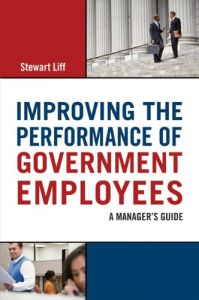Join getAbstract to access the summary!

Join getAbstract to access the summary!
Stewart Liff
Improving the Performance of Government Employees
A Manager's Guide
AMACOM, 2011
What's inside?
“Public service” does not have to be an oxymoron.
Recommendation
Citizens are more likely to see government agencies as lumbering, inefficient bureaucracies than as organizations that produce outstanding customer service, achieve high-quality performance and demand accountability. It doesn’t have to be that way. Veterans Administration human resources expert Stewart Liff outlines methods and tools government managers can use to make their staff members more effective and client-oriented, and to guide them to focus on doing a great job. Liff is a government HR pro, but you don’t have to be an expert to benefit from his book. If you’re looking to inject some enthusiasm and accountability into the government operation you manage, getAbstract recommends this handy guide.
Summary
About the Author
Human resources professional Stewart Liff has spent more than three decades in government, most notably at the Veterans Administration.




















Comment on this summary